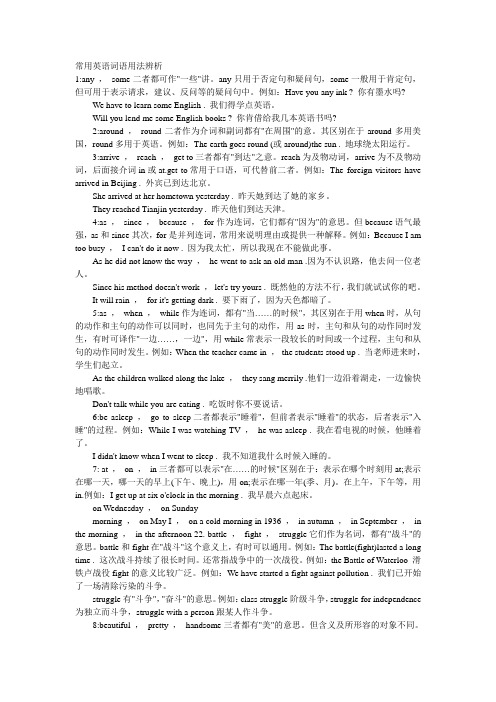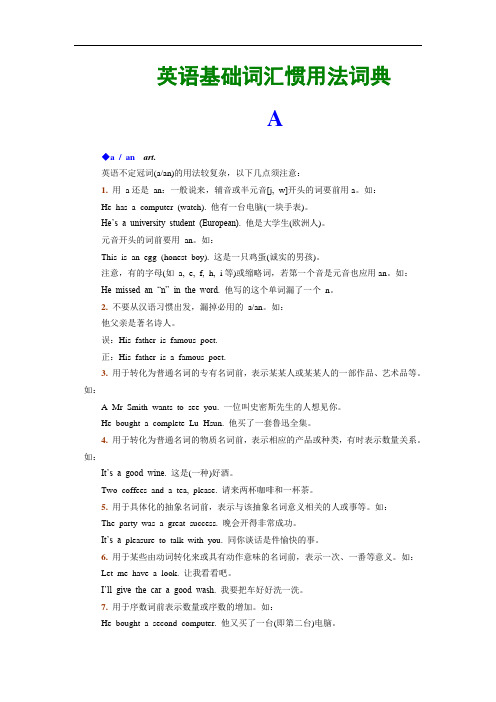英语词汇用法
高中英语人教新教材必修三全册词汇用法知识点清单(分单元编排)

高中英语必修三词汇用法知识点unit11.dress (sb) up 穿上盛装;装扮•dress (sb) up as...(把某人)打扮成……dress oneself/sb 给……穿衣(表示动作)•be dressed in...穿着……(表示状态)get dressed 穿好衣服【点拨】①put on 穿上,戴上(表示动作)②wear sth 穿上,戴上(表示状态)③be in+颜色穿着……颜色的衣服(表示状态)2.congratulation n.祝贺;恭喜 [pl.]贺词•express/send/offer one’s congratulations to sb (on sth) (因某事)向某人致以祝贺a letter of congratulation 贺信•congratulatevt.向(某人)道贺;(因某事)为自己感到自豪congratulate sb on (doing) sth 因(做)某事向某人祝贺eg. Congratulationsto Yang Qian on winning the shooting championship at the 2020 Tokyo Olympic Games.(祝贺信)祝贺杨倩在2020年东京奥运会获得射击冠军。
3.after all 毕竟;别忘了in all 总共above all 最重要的是;尤其是first of all 首先;第一at all 丝毫;根本all in all 总的来说;最重要的是eg. No one can easily succeed.After all, Rome is not built in one day.(建议信) 没有人能轻易成功,毕竟罗马不是一日建成的。
4.range n.一系列;范围,界限vi.包括;(在一定范围内)变化•a wide range of 一系列……within/in the range of 在……范围内beyond one’s range 某人能力达不到的•range from...to...在……范围内变动range between...and...在……范围内变动eg. In addition to these traditional activities,we have a wide range of choices such as travelling and visiting our relatives or friends.(推荐信)除了这些传统的活动外,我们还有很多的选择,比如旅游、拜访亲戚或朋友。
常用英语词语用法辨析

常用英语词语用法辨析1:any ,some二者都可作"一些"讲。
any只用于否定句和疑问句,some一般用于肯定句,但可用于表示请求,建议、反问等的疑问句中。
例如:Have you any ink ? 你有墨水吗?We have to learn some English . 我们得学点英语。
Will you lend me some English books ? 你肯借给我几本英语书吗?2:around ,round二者作为介词和副词都有"在周围"的意。
其区别在于around多用美国,round多用于英语。
例如:The earth goes round (或around)the sun . 地球绕太阳运行。
3:arrive ,reach ,get to三者都有"到达"之意。
reach为及物动词,arrive为不及物动词,后面接介词in或at.get to常用于口语,可代替前二者。
例如:The foreign visitors have arrived in Beijing . 外宾已到达北京。
She arrived at her hometown yesterday . 昨天她到达了她的家乡。
They reached Tianjin yesterday . 昨天他们到达天津。
4:as ,since ,because ,for作为连词,它们都有"因为"的意思。
但because语气最强,as和since其次,for是并列连词,常用来说明理由或提供一种解释。
例如:Because I am too busy ,I can't do it now . 因为我太忙,所以我现在不能做此事。
As he did not know the way ,he went to ask an old man .因为不认识路,他去问一位老人。
英语语法词汇详解be,have,give,get用法

英语语法词汇详解be,have,give,get用法(1) “be”将所有事物还原为一种状态。
中文说动词“给”,英文说“you are here”,东西也在这里,是一种状态。
另一个例子:“I'll be right there.---我很快就会到。
我们的意思是“to”,英语的意思是“I'm there”。
示例:(1)我很快就会回来。
I'll be back soon.(2) (这是)我的款待。
(It is)my treat.(3) 你是个好舞者。
你跳得真好。
You're a good dancer.(4) 说来话长。
很长的故事。
lt's a long story.(5) 你了解小鸡吗?他们是一个巨大的责任。
Do you know anything about chicks?They are a huge responsibility.你知道怎么养小鸡吗?他们需要付出很多努力来照顾。
(这个例子来自美剧《老友记》)(6) 如果我只是嗤之以鼻,他会在我家门口端上鸡汤。
即使我只是闻一闻,他也会端着一碗鸡汤出现在我家门口。
If I just snife,he3 at my door with chicken soup.更多示例:(1) 我们在哪里?我们在哪里说话? Where were we?(2) 这些年你过得怎么样?这些年你过得怎么样? How have you been these years?(3) 我不希望它太多。
我不想化太多妆。
I don' t want it to be too much.(4) 对不起,我想你可能在我们的座位上。
对不起,我想你在我们的座位上。
Sory, I think you may be in our my seats.(5) 有可能被洪水破坏。
可以用水清洗。
There are might be flood damage.(6) 你们去吧,我可能会等一会儿。
高考英语重点词汇语法用法总结大全

高考英语重点词汇语法用法总结大全1. ought to应当,应该2. keep up with跟上,赶上3. plenty of许多,大量的(作定语)4. in plenty许多,丰富(作状语)5. make a choice做出选6. now and then偶尔,时而7. prepare a dish做一道菜8. a balance diet均衡饮食9. be/go on diet在节食no longer不再10. be based on/upon以…为基础take medicine吃药11. be harmful to对…有害12. offer advise about/on提…的建议13. lose weight减肥14. cut …into pieces把…切碎15. gain weight=put on weight增肥16. make up for补偿17. get along with和…相处18. put up with忍受19. go for sb对某人也一样20. in large amount大批地21. be short of=be lacking of 缺乏,缺少22. do up one’s hair做发型23. refer to查阅,提到24. settle down定下心来,安家落户25. settle up付清,结账26. settle for勉强同意,接受27. settle in(使)习惯(环境等)28. settle on定居(短暂停留)of high/good quality高质量的29. sign an agreement with…与…达成协30. in relation to与…有关的31. but for要不是32. thanks to由于,幸亏33. apart from除…之外34. hand down传下来35. and so on等等36. in ancient time在古代37. go against违背38. guide to(介词)指导39. of (no) effect(无)效40. take effect生效,奏效41. bring/carry…into/to effect实施42. come/go into effect开始实施43. depend on/upon依靠44. That/It (all) depends.这很难说。
中考英语重点词汇用法:字母开头n

N1. name /neɪm/【词义】n 名字;名称--- What’s your name?--- 你叫什么名字?--- My name is Liu Xiaopeng.--- 我叫刘小朋。
name还可以作动词,意为“给---取名或起名”。
如:The father named his son Tom.这位父亲给他的儿子取名叫汤姆。
【短语】(1) first name 名His first name is Tom.他的名为Tom。
(2) last name = family name 姓His last name is Green.他姓格林。
【扩展】(1) 中文姓名的英文拼写方法:按照汉语拼音拼写,姓在前,名在后,姓和名分开写,姓和名的开头字母均大写。
如:两个字:张三:Zhang San三个字:①单姓:刘小朋:Liu Xiaopeng②复姓:诸葛亮:Zhuge Liang四个字:①单姓:李雨中生:Li Yuzhongsheng②复姓:司马相如:Sima Xiangru但是,由于外国人习惯将名放在前面,姓放在后面;而中国人的姓名,则是姓在前名在后,有时在国外填写资料时常会搞错,建议在打履历表、印名片或处理资料时,如果填写姓名的地方没有注明Last Name时,英文姓名正确的表达方法也可以这样写,如:刘小朋:Xiaopeng Liu或Liu, Xiaopeng(2) 中文地名的英文拼写方法:一般情况下,仍然按照汉语拼音拼写,首字母大写,通常拼写成一个单词。
如:山西:Shanxi北京:Beijing上海:Shanghai但也有不按照汉语拼音拼写的特殊情况,如哈尔滨:Harbin;呼和浩特:Hohhot等。
2. national /ˈnæʃənəl/【词义】adj 国家的;民族的Lin Zexu is a nationl hero.林则徐是一位民族英雄。
We raise the national flag every Monday.我们每周一升国旗。
英语基础词汇惯用法词典

英语基础词汇惯用法词典A◆a / an art.英语不定冠词(a/an)的用法较复杂,以下几点须注意:1.用a还是an:一般说来,辅音或半元音[j, w]开头的词要前用a。
如:He has a computer (watch). 他有一台电脑(一块手表)。
He’s a university student (European). 他是大学生(欧洲人)。
元音开头的词前要用an。
如:This is an egg (honest boy). 这是一只鸡蛋(诚实的男孩)。
注意,有的字母(如a, e, f, h, i等)或缩略词,若第一个音是元音也应用an。
如:He missed an “n” in the word. 他写的这个单词漏了一个n。
2.不要从汉语习惯出发,漏掉必用的a/an。
如:他父亲是著名诗人。
误:His father is famous poet.正:His father is a famous poet.3.用于转化为普通名词的专有名词前,表示某某人或某某人的一部作品、艺术品等。
如:A Mr Smith wants to see you. 一位叫史密斯先生的人想见你。
He bought a complete Lu Hsun.他买了一套鲁迅全集。
4.用于转化为普通名词的物质名词前,表示相应的产品或种类,有时表示数量关系。
如:It’s a good wine. 这是(一种)好酒。
Two coffees and a tea, please. 请来两杯咖啡和一杯茶。
5.用于具体化的抽象名词前,表示与该抽象名词意义相关的人或事等。
如:The party was a great success. 晚会开得非常成功。
It’s a pleasure to talk with you. 同你谈话是件愉快的事。
6.用于某些由动词转化来或具有动作意味的名词前,表示一次、一番等意义。
如:Let me have a look. 让我看看吧。
英语中各种词性的用法及解释
英语中百般词汇性的用法及阐明之阳早格格创做1.名词汇名词汇不妨分为博有名词汇(Proper Nouns)战一般名词汇 (Common Nouns),博有名词汇是某个(些)人,场合,机构等博有的称呼,如Beijing,China等.一般名词汇是一类人大概物品大概是一个抽象观念的名词汇,如:book,sadness等.一般名词汇又可分为底下四类:1)个体名词汇(Individual Nouns):表示某类人大概物品中的个体,如:gun.2)普遍名词汇(Collective Nouns):表示若搞个个体组成的集中体,如:family.3)物量名词汇(Material Nouns):表示无法分为个体的真物,如:air.4)抽象名词汇(Abstract Nouns):表示动做、状态、本量、感情等抽象观念,如:work.2. 形容词汇形容词汇建饰名词汇,证明真物大概人的本量大概特性.常常,可将形容词汇分成本量形容词汇战道述形容词汇二类,其位子纷歧定皆搁正在名词汇前里.1) 曲交证明真物的本量大概特性的形容词汇是本量形容词汇,它有级的变更,不妨用程度副词汇建饰,正在句中可做定语、表语战补语.比圆:hot 热的.2) 道述形容词汇只可做表语,所以又称为表语形容词汇.那类形容词汇不级的变更,也不可用程度副词汇建饰.大普遍以a启头的形容词汇皆属于那一类.比圆:afraid 害怕的.(错) He is an ill man.(对于) The man is ill.(错) She is an afraid girl.(对于) The girl is afraid.那类词汇另有:well,unwell,ill,faint,afraid,alike,alive,alone,asleep,awake 等.3)形容词汇做定语建饰名词汇时,要搁正在名词汇的前边.然而是如果形容词汇建饰以-thing为字尾的词汇语时,要搁正在那些词汇之后,比圆:something nice3.副词汇及其基础用法副词汇主要用去建饰动词汇,形容词汇,副词汇大概其余结构.一、副词汇的位子:1)正在动词汇之前.2)正在be动词汇、帮动词汇之后.3)多个帮动词汇时,副词汇普遍搁正在第一个帮动词汇后. 注意:a. 大普遍办法副词汇位于句尾,然而宾语过少,副词汇不妨提前,以使句子仄稳.We could see very clearly a strange light ahead of us.b. 办法副词汇well,badly糟、坏,hard等只搁正在句尾. He speaks English well.二、副词汇的排列程序:1)时间,天面副词汇,小单位的正在前,大单位正在后. 2)办法副词汇,短的正在前,少的正在后,并用and大概but等连词汇连交.Please write slowly and carefully.3)多个分歧副词汇排列:程度+天面+办法+时间副词汇. 注意:副词汇very 不妨建饰形容词汇,然而不克不迭建饰动词汇.改错:(错) I very like English.(对于) I like English very much.注意:副词汇enough要搁正在形容词汇的后里,形容词汇enough搁正在名词汇前后皆可.I don't know him well enough.There is enough food for everyone to eat.There is food enough for everyone to eat.……形容词汇/定冠词汇/大概冠词汇皆是用去建饰名词汇的adj可建饰的是可数名词汇复数大概者是单数定冠词汇可建饰不可数战可数名词汇大概冠词汇a/an建饰可数名词汇单数副词汇(adv)建饰动词汇大概者是动词汇短语be动词汇后跟形容词汇大概者是当前分词汇介词汇(prep)后里跟动名词汇普遍用于句尾罕睹的有be动词汇,特殊疑问词汇(how what where ……)等,另如祈使句,常常是Don’t…情态动词汇(aux)后跟动词汇本形通联动词汇(Lv.)后跟形容词汇本级。
英语词语用法(一)
英语词语用法一、语序颠倒,意义有别1. in all 总共,总计;all in 疲劳。
◎ He made only two mistakes in the test in all.这次考试他总共有两个错误。
◎At the end of the race Li Lei was all in.到赛跑结束时,李雷已经筋疲力尽了。
2. one another(=each other)互相;another one 另外一个,再一个。
◎ We should help one another. 我们应该互相帮助。
◎ There is a crack in this glass. Show me another one, please. 这个杯子有裂痕。
请再给我另外拿一个。
3. short for……的简称,……的简略形式;for short简称为……,缩写。
◎ U.K. is short for the United Kingdom. U.K.是联合王国的简略形式。
◎ We call her Jo for short.我们简称她乔。
4. too much太多,过分(后跟不可数名词,也可用作代词或副词);much too太,非常(后跟形容词或副词)。
◎ He drank too much tea last night.昨晚,他喝茶喝得太多了。
◎ I can’t afford the car. It is much too expensive.我买不起这辆车。
它太贵了。
5. all over遍及,到处,全身;over all总的来说,大体上。
◎ You can find people like him all over the world.你到处都可以找到像他这样的人。
◎ Over all, the book is good.总的来说,这本书还不错。
6. turn in 上交,上床睡觉(口语);in turn依次,轮流,逐个。
中考重点常见词汇和短语的用法
中考重点常见词汇和短语的用法中考是中国学生升入高中的重要考试,其中的英语考试是学生们关注的焦点。
在英语考试中,词汇和短语是考试中必不可少的一部分。
本文将介绍一些中考重点常见词汇和短语的正确用法。
一、动词的正确用法1. learn:学习、得知例句:We learn new words every day.(我们每天学习新单词。
)2. practice:练习、实践例句:You should practice speaking English every day.(你应该每天练习说英语。
)3. improve:改进、提高例句:You can improve your English by reading more books.(通过多读书,你可以提高英语水平。
)4. understand:理解、明白例句:I don't understand the meaning of this word.(我不明白这个单词的意思。
)5. remember:记住例句:Please remember to bring your passport when you travel.(旅行时,请记得带上你的护照。
)二、名词的正确用法1. exam:考试例句:I have an English exam tomorrow.(我明天有一场英语考试。
)2. grade:年级、分数例句:He is in the fifth grade.(他在五年级。
)3. subject:科目例句:Math is my favorite subject.(数学是我最喜欢的科目。
)4. book:书例句:I borrowed a book from the library.(我从图书馆借了本书。
)5. knowledge:知识例句:Reading can broaden our knowledge.(阅读可以扩大我们的知识面。
)三、形容词和副词的正确用法1. difficult:困难的例句:This math problem is difficult to solve.(这个数学问题很难解。
英语常用词汇简明用法(T-Y)
英语常用词汇简明用法?(T-Y)338. take 用法:take up/on/for/off/back/away/out/down, take it for granted that…Note: 当take表示花费的时候,常用it作形式主语,即It takes/took sb. some time to do sth.take vt.耗费(时间);需要I used to take a walk in the early morning. 我过去常一大早出去散步。
take away 拿走,离开20. I want to take away the book which you showed me yesterday.我想带走你昨天给我看的那本书。
take back 拿回来take b ack one's words 收回(刚讲的话)take A for B 把A误认为是B take in sth 接受take in sb 欺骗take off 起飞,取消Before gold,even kings take off their hats. 在黄金面前,国王也要脱帽。
take on 呈现,承担The U.S. will take one route, the Japan take other. 美国和日本采取不同的新路径。
take on sb 雇用take up 占据(时间,地方),从事于take pride in =be proud of 引以为豪take turn 轮流take in turn 依次take pains to do 努力做某事take a chance 碰运气take a lead 带头take effect 生效take charge of 负责take one's leave告辞339. talk 用法:talk of/about/back; talk sth. OverNote: talk主要强调说话者之间的交流,不强调说的内容。
- 1、下载文档前请自行甄别文档内容的完整性,平台不提供额外的编辑、内容补充、找答案等附加服务。
- 2、"仅部分预览"的文档,不可在线预览部分如存在完整性等问题,可反馈申请退款(可完整预览的文档不适用该条件!)。
- 3、如文档侵犯您的权益,请联系客服反馈,我们会尽快为您处理(人工客服工作时间:9:00-18:30)。
英语词汇用法1.a/an/the/a book/an apple/an “s”/anhour/a European/at a loss/in danger/at risk/go on a diet/for fun/be great fun/have a knowledge of2.abandon one’s family/abandonone’s plan3.work to the best of one’s ability/develop one’s ability of listening/have the ability to do sth4.be unable to do anything but wait/an able man5.abnormal/normal6.go aboard/go aboard a ship7.was about to do sth when…/wason the point doing sth = happened to be doing sth when…/what about =how about sth?/set about doingsth=set out to do sth8.be above the sea level/sb/be aheadof sb/above all9.go abroad for futher study10.in the absence of sb/sth =for lack of sth/sb/sth be absent from11.absolute ignorance/absolute power/absolute proof/relative/absolutely/definitely12.Black cloth absorbs light/absorb aheavy blow/be absorbed in13.The idea of happiness is abstract/the abstract of book14.abuse one’s eye/abuse one’ son15.academic degree/an academicinterest in politics16.accept…as…/be acceptable to sb17.the only access to the village/gainaccess to the house through the window/have/obtain the access to the Internet/be accessible to my car(by car) 18.by accident = by chance =accidentally = occasionally/accidental19.accommodation20.accompany sb to the school/keep sbcompany/be with/stay with sb/accompany the singer on piano 21.accomplish wonders/something/nothing22.according to what he said/the factthat he was ill23.account for = explain(to sb)= bringout = set out/account for 4%/give sb a vivid account of=report vividly/open a bank account/on account of/on no account=under no circumstances=by no means=in no way/at no time/by no means will I do/accountant24.accumulate a large fortune25.accurately/accurate timing/timer/accuracy26.accuse sb of doing sth/theft/chargesb with doing sth27.accustom children to getting upearly/get (oneself) accustomed to/ accustom oneself to new surrounding28.achieve one’s goal/set one’s goal/achieve nothing without effort/ achievement29.acid taster/acid rain30.acknowledge doing sth / one’smistake/acknowledge one’s letter/ be acknowledge as(to be)/admit31.acquire = obtain32.get across/ run across/come across= meet with/3 meters across/shout across (through) the room/across the station33.an act of kindness/in the act of…/Act. / act the part of sb / act out dialogue/act as/act as if/act for /act on(upon) /take strict action todo/suit action to words / actions speak louder than words/ take an active (passive) part in (sth/doing sth)/do a lot of activity =sport =exercise/actor/actress34.actual price / an actual event / inactual fact/actually =as a matter of fact=in fact =in effect =in reality / as a matter of course35.adapt myself …to …(doing sth)/adjust … to …/adopt sb/a plan 36.add…to…/add to the beauty/addup to 9/ in addition (to that) = besides(that)37.additives/explosives/relatives38.address the public / address theletter39.adequately=properly/good enough/take adequate action to do sth 40.administer a company / the law /help to refugees / administrate the departmet / administrator / administration41.admire sb for sincerity = admirehis sincerity/adore/respect42.pay for admission / admission tothis school is for boys / gain admission to this school / admit one’s error/admit doing /admit that…/ admit sb to be foolish/ be admitted to(into) FudanUniversity 43.The soldiers advanced to the town/stop one’advance/advance sb some money/As science advances/make some advances (advancement) / book the tickets in advance/ an advanced teacher44.take some advantage of=use=makeuse of sb to do sth/have the advantage of developing mentally and physically / discuss the advantages and disadvantages of shopping online / advantageous condition 45.a spirit of adventure/have a lot ofadventures/joint venture/experience46.advertise a new product on TV/advertise for a job47.give sb a piece of advice on/about/as to how to do sth/concerning/ regarding / as for / in(with) regard (respect/reference) to/advise sb to do sth/advise (that) sb should do/ persuade sb into doing sth/try to persuade sb to do sth/advisable 48.aeroplane / airplane /the aerospaceindustry49.current affairs/love affairs。
